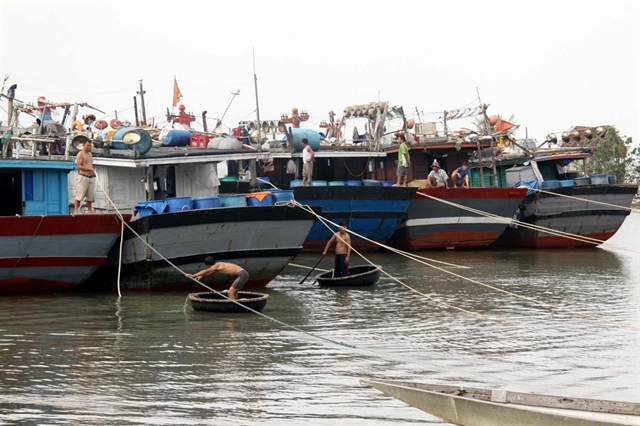 Society
Society

 |
| Fishing boats docked at Phú Hải Port in the central Thừa Thiên Huế Province. — VNA/VNS Photo Quốc Việt |
THỪA THIÊN HUẾ — In a move for more sustainable seafood resources and to increase fishery product values, Thừa Thiên Huế is putting its focus on building “green” ports.
The once polluted, mucky ports are transforming thanks to the awareness and efforts of fishermen when ships return to the docks.
In Huế City’s Thuận An Port, Trần Văn Cường is one of the pioneer fishermen to collect plastic trash after each trip to the sea.
At 31 years old, Cường is already a captain and shipowner of a 1,000-CV vessel.
In the fishing season, which lasts from the fourth to the ninth lunar months every year, Cường and his shipmates would spend days, sometimes even weeks out at sea.
His joy is not only bringing back a compartment full of fish and squid, but also the plastic bags they collect from the water.
Cường said that it all started with the campaign “Green Sunday” initiated by the provincial People’s Committee.
Every week, young people in the coastal fishing village of Thuận An would team up and collect trash along the shoreline, especially when strong waves bring in all kinds of waste to the land, from styrofoam boxes to torn nets and plastic bottles.
Cường came up with the idea to sort non-biodegradable trash on his ship, instead of throwing them back into the sea following the usual habits.
Taking a step further, he also designed a long-handle racket to collect trash floating on the surface.
Cường said: “There were trips where, up to 30 or 40 per cent of what was caught in the fishing nets was trash, tangled with the fishes.
“This is an alarming pollution situation that calls for help from fishermen to take practical actions, such as not littering plastic trash and single-use packaging that are difficult to degrade.
“Many large fish and sea turtles mistake these plastic bags for ephemerals, which is part of their diet.”
In the beginning, he said people found his behaviour erratic when he brought sack after sack of trash ashore.
However, five years have passed, and many local shipowners now follow suit and collect trash to the sea, which will then be transported to a treatment plant at the fishing port.
Nguyễn Thành Phát, another local fisherman, believes that plastic waste is a critical problem to the sustainability of the marine ecosystem.
If there is not a shift in the mindset and actions of the locals who make a living from the sea, soon marine resources will deplete, he said.
While busy loading necessities for the last fishing trip this year, Phát still keeps in mind to tie a long net at one end of his vessel to collect trash during fishing.
He said: “We gillnet at the Paracels and each trip would last about 12 days, so the amount of trash could go up to dozens of kilogrammes.
“Collecting single-use and non-degradable waste to the shore would help clean the ocean and protect marine resources for future generations.”
With a 128km coastline, Thừa Thiên Huế Province has three major ports which are Thuận An, Phú Hải and Tư Hiền.
These facilities are receiving investment for an upgrade, particularly for comprehensive waste collection and treatment systems that would turn them into green, eco-friendly fishing ports.
According to the province’s management board for fishing ports, plastic waste pollution has been a common issue at these locations. Thuận An Port in Huế City, for example, sees around one tonne of trash collected on a daily average.
The board’s director Trần Quang Nhất said that changing habits in waste management on the vessels and at the ports requires time and consistency.
The board is also working with the World Wildlife Fund (WFF) in Việt Nam to provide trash nets for fishing boats. The trash collected would then be collected, sorted, processed and recycled by the fishing ports.
Nhất said: “We are aiming to develop Thừa Thiên Huế fishing ports to become members of the international green fishing ports association, which has criteria on waste collection and treatment during fishing and at the port.
“When they are recognised, the values of their catches will also increase, bringing in socio-economic and health benefits for people.” — VNS




